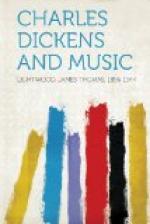Oh let us love our occupations,
Bless the squire and his relations,
Live upon our daily rations,
And always know our proper
stations.
The reference to the ‘new system’ is not quite obvious. Dickens may have been thinking of the ‘Wilhem’ method of teaching singing which his friend Hullah introduced into England, or it may be a reference to the Tonic Sol-fa system, which had already begun to make progress when The Chimes was written in 1844.[7]
There are some well-known lines which owners of books were fond of writing on the fly-leaf in order that there might be no mistake as to the name of the possessor. The general form was something like this:
John Wigglesworth is my name,
And England is
my nation;
London is my dwelling-place,
And Christ is
my salvation.
(See Choir, Jan., 1912, p. 5.) Dickens gives us at least two variants of this. In Edwin Drood, Durdles says of the Mayor of Cloisterham:
Mister Sapsea is his name,
England is his
nation,
Cloisterham’s his dwelling-place,
Aukshneer’s
his occupation.
And Captain Cuttle thus describes himself, ascribing the authorship of the words to Job—but then literary accuracy was not the Captain’s strong point:
Cap’en Cuttle is my
name,
And England is
my nation,
This here is my dwelling-place,
And blessed be
creation.
It is said that there appeared in the London Singer’s Magazine for 1839 ’The Teetotal Excursion, an original Comic Song by Boz, sung at the London Concerts,’ but it is not in my copy of this song-book, nor have I ever seen it.
Dickens was always very careful in his choice of names and titles, and the evolution of some of the latter is very interesting. One of the many he conceived for the magazine which was to succeed Household Words was Household Harmony, while another was Home Music. Considering his dislike of bells in general, it is rather surprising that two other suggestions were English Bells and Weekly Bells, but the final choice was All the Year Round. Only once does he make use of a musician’s name in his novels, and that is in Great Expectations. Philip, otherwise known as Pip, the hero, becomes friendly with Herbert Pocket. The latter objects to the name Philip, ‘it sounds like a moral boy out of a spelling-book,’ and as Pip had been a blacksmith and the two youngsters were ‘harmonious,’ Pocket asks him:
’Would you mind Handel
for a familiar name? There’s
a charming piece of music,
by Handel, called the
“Harmonious Blacksmith."’
‘I should like it very much.’
Dickens’ only contribution to hymnology appeared in the Daily News February 14, 1846, with the title ’Hymn of the Wiltshire Labourers.’ It was written after reading a speech at one of the night meetings of the wives of agricultural labourers in Wiltshire, held with the object of petitioning for Free Trade. This is the first verse:




